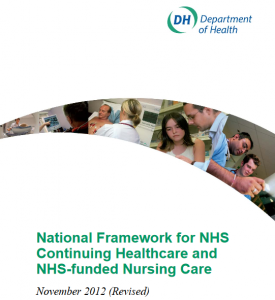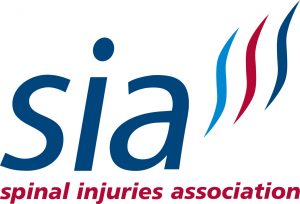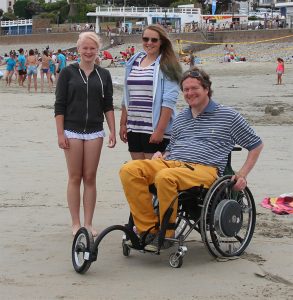This had to be the lowest point in my life. Amanda had left, Zoe had gone with her along with the cats, and I was left in the house with 24 hour live in carer provided by an agency. Up until this time I had had regular carers coming in during the week, and another two on alternate weekends. I had been lucky enough to keep the same people for 5 years; they knew me and understood what I needed. Suddenly I had nobody around me who I knew. Fortunately the agency, Origin, did send somebody who was young, fun, and intelligent. She got on brilliantly with Zoe, who saw her like a big sister. The agency sent people two weeks on, two weeks off; this was quite disruptive because both Zoe and I had to keep getting used to a new person. The agency did do what they could to keep things consistent, but some carers did work out better than others.
Having just lost Amanda’s income to the house, Social Services thought that this would be the perfect time to review how my care should be funded, because obviously their bill had grown substantially as a result of the increase in hours, plus agency fees. Social care is means tested, and when I was originally assessed my insurance income was being paid through my employer, along with the small income I received as “therapeutic earnings”. Earned income cannot be taken into account in calculating a person’s ability to pay for care, hence for the previous 10 years I had not been required to contribute towards my care package. As a result of this review, the assessor determined that because I was now receiving the same insurance income directly, and no longer earned a therapeutic income, that I could now afford to pay £350 a week towards my care. This would leave me completely housebound, unable to run a car, and definitely with no possibility of doing the things I enjoyed and that kept me healthy. What is the point of contributing to a Permanent Health Insurance policy to protect your lifestyle in the event of such an accident or illness, if the Local Authority then take this off you to pay for your care? Leaving you in exactly the same position that you would have been in had you never worked and lived off benefits all your life. Further, there was a possibility that since I had been made redundant in 2004, that I would also have to pay for the care that I had been receiving for the previous 5 years.
It felt like my life had just been ripped away. What would be the point of me existing like that, just waiting to die? The policy on funding social care seems to have been taken directly from the policy for the elderly and doesn’t consider the outgoings that younger people have, or any potential to have a life. This in my view needs addressing! The social worker that I had been assigned made Jeremy Corbin look like Margaret Thatcher. It seemed to be that because I did have an OK house and car, that I was her new target for alleviating her care budget shortfall. I wouldn’t have had a problem if I had been asked to contribute something towards the cost of my care, but to leave me with nothing seemed unfair. Of course the house was still heavily mortgaged, and the divorce lawyers would be expecting me to buy Amanda’s share. The vultures were circling, and I was losing the will to live.
I turned to the SIA for advice. They told me about Continuing Healthcare Funding (CHC), and it sounded likely that I should qualify for it. CHC funding is provided by the NHS, is not means tested, and is given to those who have a Primary Health need. If a person’s needs are beyond what should legally be provided by the Local Authority, then that person’s needs should be met in their entirety by the NHS. The case law that the criteria for eligibility is based on is the Pamela Coghlan judgement. Pamela is also a c5/6 complete tetraplegic, with very similar needs to my own. Whilst with many conditions it is not possible to say that two people will have the same needs, and therefore qualify for CHC; with spinal injuries, a person with the same level of injury will have the same basic care needs which are complex, unpredictable, intense, severe, and require skilled interventions by trained carers.
Brilliant I thought. Armed with this new information, and slightly bemused by why the Social Worker hadn’t suggested this, I asked her if I could apply for CHC funding. The answer was “No. There are loads of people who are worse than you, and I’ve never managed to get them to qualify”. What? How could this be? I took the same question to my District nurse. “I’ve never applied for anybody before, I don’t think you’ll qualify” she said. She did however come round with the Initial Checklist Assessment form to see if I could go on to the full assessment. Having completed this, she was quite surprised to understand my health needs, and to realise that it appeared that I might have a good case. This did then trigger a full assessment.
A nurse assessor was sent from the NHS Continuing Healthcare team to complete the assessment. I wasn’t particularly encouraged by her opening statement: “You’re far too able, there is no way that you will qualify”. This was before she had even asked me anything about my clinical needs. Needless to say, her recommendation was that I did not qualify. Spookily I complained about this.
I contacted the SIA again to explain what had happened. I attended a workshop on Funding and Managing Care, which armed me with all the information and answers that I would need to ensure that my assessment was carried out following the procedures outlined in the National framework. This exists, in theory, to ensure fair, thorough practices, and national consistency. Anyway, to cut a long story short, I was able to get the replacement nurse assessor to conduct the next assessment with the right people present, and with information relating to my clinical needs from my GP, Consultant, and care agency. This was not easy; she had tried to say that it was not the place of the Social a Worker, or District Nurse to give a score or recommendation in the assessment. I minuted the meeting so that we had a record of their opinions, because it is their views which should be recorded. The result was a recommendation that I qualified for CHC funding. I had to attend a panel meeting, and when quizzed on a few details, my scores were actually changed upwards, making my eligibility clear. I was granted CHC funding. What a relief.
This was of course not the end of it. Three months later the same nurse assessor came out for a reassessment. To anybody with the vaguest knowledge of spinal cord injury, it would be obvious that nothing would change in terms of my needs in 3 months, or at all since i’d been injured for 10 years. In fact over time, they will only get greater. So I was quite surprised to hear from her that since I was paralysed from the chest down, that miraculously I was no longer doubly incontinent in her view. This apparently was based on no new information, or physical change, but resulted in a recommendation from her that I was no longer eligible. Over the next 3 and a half years they sent 4 other equally as incompetent nurse assessors who were trying to get me off being funded for my care through the NHS. The best one was the final one who told the panel (I was not allowed to attend), “A carer helps David into the car and positions his feet on the pedals”. I don’t think she entirely grasped total paralysis below the chest. This would, I suggest be a dangerous way for me to drive. These Nurse Assessors were employed by ATOS, the shamed bureau who certificated people as fit for work when they were not. I don’t know how they sleep at night, and it annoys me that unless you know your rights, are articulate, and you’re prepared to fight, that it is unlikely that you will qualify for CHC funding. It is wrong!
The pursuing, obvious complaint resulted in an appeal. I complained to the Nursing and Midwifery Council about that Nurse Assessor, unfortunately to no avail. An Independent GP who understood the eligibility criteria for CHC funding was sent to assess my needs. The main problem is that over the years you learn certain tricks, and have certain equipment, which make you look less disabled than you really are. Also I was getting out and sailing, skiing, playing wheelchair rugby, and the nurse assessors could not understand that my clinical needs still require the necessary level of care to qualify. Fortunately the GP did, and after four and a half years of anxiety and stress, an emphatic report from him resulted in acceptance from the NHS that I do qualify. I will still be assessed each year, but find it hard to believe they can dispute my eligibility any more.
At times I thought that I would lose my funding, and have no life. This was too much to bear, and I was fully prepared to go to Dignitas if my CHC care funding had been withdrawn. I wanted to make a point and expose what the NHS were doing. During this time, the NHS also provided me with care from a local agency that had no experience in live-in care, spinal injury, or bowel management. They sent untrained, newly recruited carers who were completely inappropriate for me, but because the agency was owned by a registered GP this was apparently ok. The final straw was when one of the carers from this ‘other’ agency (allegedly) took my cards to the cash point both sides of midnight to benefit from 2 day’s withdrawal limits (although apparently there was no evidence!). Now I insisted on a specialist agency, and questioned why I had been given the ‘other’ one in the first place? I can only assume that they deliberately gave me a bad experience because all through the process they had told me that the type of care that they could provide might not suit my lifestyle. They did prove that point very well and eventually my care was managed through Origin and Active Assistance – both providing live-in specialist care.
During this period I started to do some “Permitted work” for the SIA, delivering the workshop that I had benefitted from. It broke my heart to hear of so many other, even more obviously eligible cases, and geographical differences in assessment that existed. My advice to anybody out there in a similar situation, is do your homework, understand the criteria and your rights, and be prepared to fight.
The good news is that once I was found to be eligible for Continuing Healthcare funding for the second time, a new system for providing care was introduced by the NHS; Personal Health Budgets. The idea behind this is to give people who qualify for CHC funding greater choice over how they use the agreed budget they are given. For example to purchase a Freewheel to enable me to get out for walks across rough terrain. For the first time in 15 years I managed to get on a beach with Zoe and Nicky. Also, I was able to put money towards emotion wheels which I need to help push my chair; without these I struggle to push across a carpet, or a gradual incline. This more holistic approach by the NHS to funding care is to be applauded; looking at improving the health and wellbeing of people with severe disabilities will reduce the long term burden on the NHS. In my case, transferring to a PHB also resulted in an overall reduction in the cost of the package of care that I was receiving. It’s not for everybody, but it works for me. Many people are concerned that the change could be a cost cutting exercise, which is fine provided that this does not have a detrimental effect on the quality or quantity of care being provided for an individual.
Apart from the increased freedom that equipment such as the Freewheel and E-motion wheels give you, they are beneficial to a person’s health. Without them a person with my level of disability has very few opportunities for cardiovascular exercise. Pushing a manual chair I am dependent on help, and this I find really embarrassing. Also, being pushed I have had many falls out of the chair because of unseen bumps or holes. Many wheelchair users suffer with shoulder damage and carpel tunnel syndrome, so this power assisted system is brilliant for alleviating the strain. Unfortunately they are very expensive, and the wheelchair service do not cover this cost, or even the cost of a suitable wheelchair. Fortunately there are some amazing charities out there who have helped me with this. Many thanks to: Aspire and Regain.






It’s amazing that at such a low point in your life you were able to find the inner strength to ‘fight’ for your rights. It shocked me that you had to prove the extent of your disability to the professional decision makers. The saying ‘adding insult to injury’ sums up the way you were treated by both ‘the system’ and some individuals ‘professionals’ and it’s to your credit David that you can write about it objectively now without rancour or self pity. How marvellous that you’ve been able to use your experiences to help others. Respect.